FW
The Indian home textiles sector has seen growth due to evolving lifestyles, and a growing awareness about home decor. As per Statista, in 2024 India’s home textile industry was worth $10 billion and expected to grow at a CAGR of 7 per cent by 2031. Other industry reports say the market will be worth $13 billion by 2025, at CAGR of 8 per cent from 2022.
Notably, Indian home textiles industry has contributed significantly to the global home textile market. With a wide range of products the sector is catering to both domestic demand and global markets.
A market in the rise
As living standards improve, consumers are increasingly investing in home furnishings, viewing them not just as necessities but as expressions of personal style. "The Indian consumer is becoming more discerning and quality-conscious," says Rajiv Arora, President of the Home Furnishing Association (HFA). They are looking for products that offer both aesthetic appeal and durability."
The home textiles market covers a wide range of products from bedding to towels; curtains to carpets. Beyond core products, the market also includes cushions, throws, table linens, and other decorative accessories. India's home textiles exports to Europe, North America, and the Middle East is significant as it’s renowned for its craftsmanship, intricate designs, and competitive pricing, which have cemented its position as a preferred supplier in global markets. Key export destinations include the US, UK, Germany, and UAE.
However, the sector faces challenges such as fluctuating raw material costs, regulatory changes, and global economic uncertainties. Adapting to fast-changing consumer preferences and digital disruption remains crucial for sustained growth, say experts.
Global players from India
India has emerged as a major player in the global home textiles market. Several large Indian corporations have become significant players in this space.
Welspun India: A global leader in home textiles, Welspun is known for its towels, bedding, and bath products. They have a strong focus on innovation and sustainability.
Trident Limited: Another major player in the home textiles market, Trident manufactures towels, bed linens, and yarn. They are known for their quality and wide range of products.
Indo Count Industries: Specializing in bed linen, Indo Count is a major exporter to several international markets. They focus on design and innovation.
Arvind Mills: While primarily known for apparel fabrics, Arvind Mills also has a presence in the home textiles segment, offering a range of products.
Raymond Group: A well-known name in the textile industry, Raymond also offers home textiles, leveraging its brand reputation and textile expertise.
While India's export strengths are undeniable, the country also faces certain challenges in the global home textiles market. Competition from other textile-producing countries, fluctuating raw material prices, and the need for continuous innovation are some of the key concerns. However, these challenges also present opportunities. By focusing on product differentiation, adopting advanced technologies, and strengthening supply chain management, Indian companies can overcome these hurdles and further enhance their global competitiveness.
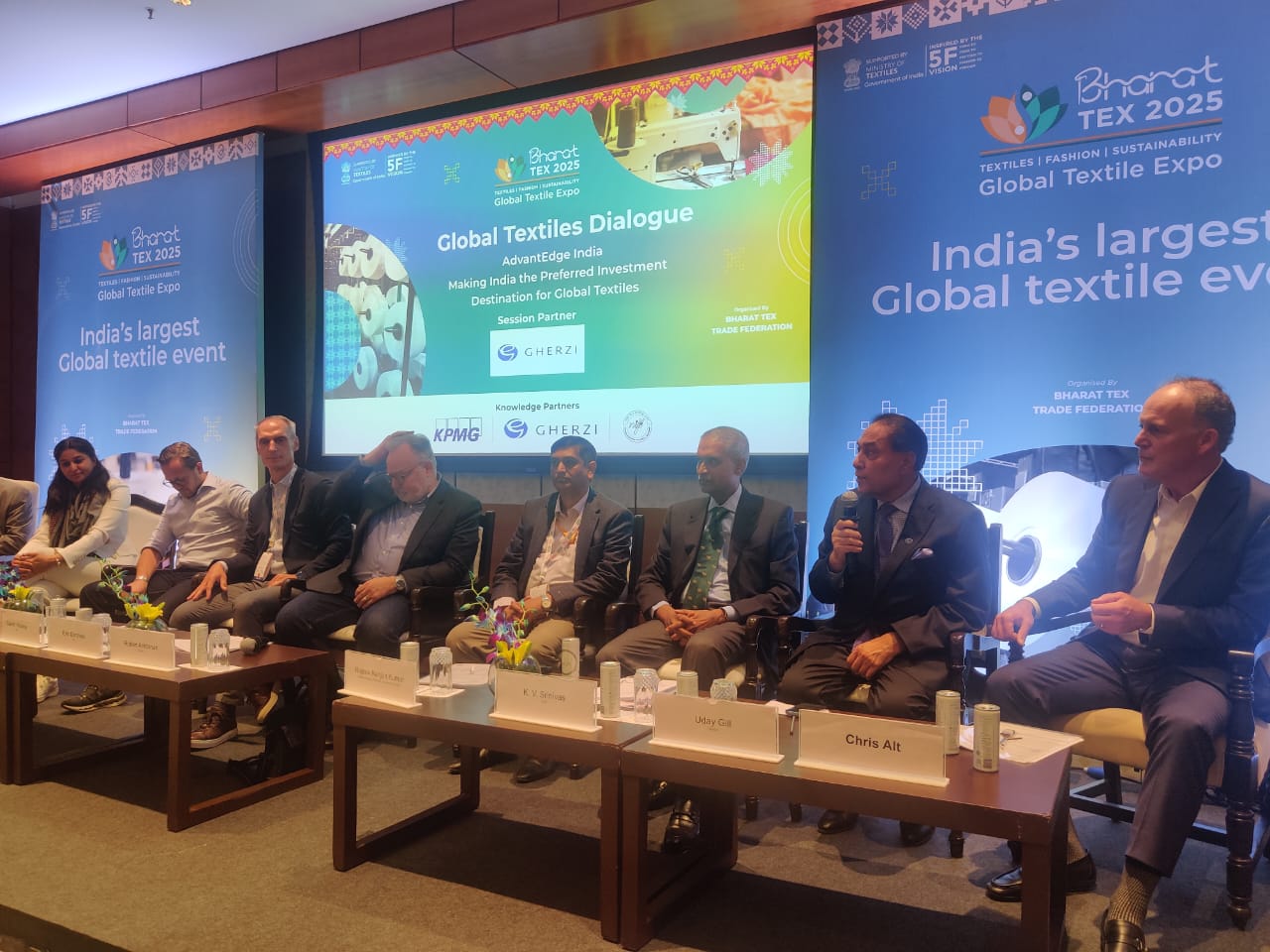
Bharat Tex 2025 showcased India's ambition to become the world's preferred textile destination. The presentation, ‘AdvantEDGE: Making India the preferred destination,’ in one of the knowledge sessions highlighted India's rich textile heritage, spanning millennia from the Indus Valley Civilization, where natural fibers like cotton thrived, to the medieval era's intricate techniques like Chikankari. As one of the speakers noted, "Our textile industry goes back to the Indus Valley Civilization." While colonial influence impacted the industry, post-independence efforts revitalized traditional crafts.
Today, India is a textile powerhouse. It's the largest jute producer, second-largest cotton, silk, polyester, and viscose producer. Kasturi cotton, with its focus on "traceability, certification, branding, sustainability," positions India as a leader in ethical sourcing. The industry contributes 2 per cent to India's GDP, a figure projected to double by 2030, mirroring India's economic growth towards a $7 trillion economy. "We are looking at doubling the economy," the speaker emphasized. The domestic market, valued at $200 billion, is also expected to reach $300 billion by 2030.
India's skilled workforce of 45 million, 70-75 per cent women, underscores the sector's social impact. With an 8 per cent current growth rate and a 10 per cent target, the industry aims to attract more investment. "Investment drives manufacturing and manufacturing drives trade," the speaker asserted, highlighting the need to increase FDI from the current $2.7 billion. India's textile exports, currently at $37 billion, also hold significant potential.
India's vision for 2047, to become a developed nation, fuels infrastructure development through initiatives like PM Gatishakti. The Amrit Kaal vision acknowledges India's young population and rising per capita income, which will drive domestic textile consumption. "Our per capita expense on textile is also one of the lowest. So, that means there is a huge opportunity," the speaker explained. Flagship programs like Make in India have already spurred growth, with shuttleless looms increasing by 108 per cent.
Key growth areas include apparel, technical textiles, and home textiles. India is a leading home textile manufacturer, with Indian-made towels and bed sheets prevalent in global markets. The government supports this growth through initiatives like Mega Integrated Textile Regions and Apparel Parks (MITRA), the National Technical Textile Mission, skill development programs, and production-linked incentive schemes. State governments also offer investor-friendly policies, including capital, land, and power subsidies. India's diverse textile clusters, spread across the country, offer a complete supply chain ecosystem, minimizing disruptions.
Invest India, the national investment promotion agency, assists investors in navigating the Indian market. India's strategic position, coupled with government support and a thriving domestic market, makes it an attractive destination for textile investment. As the speaker concluded, "India is well poised to help you diversify your value chain and also to maximize your return."
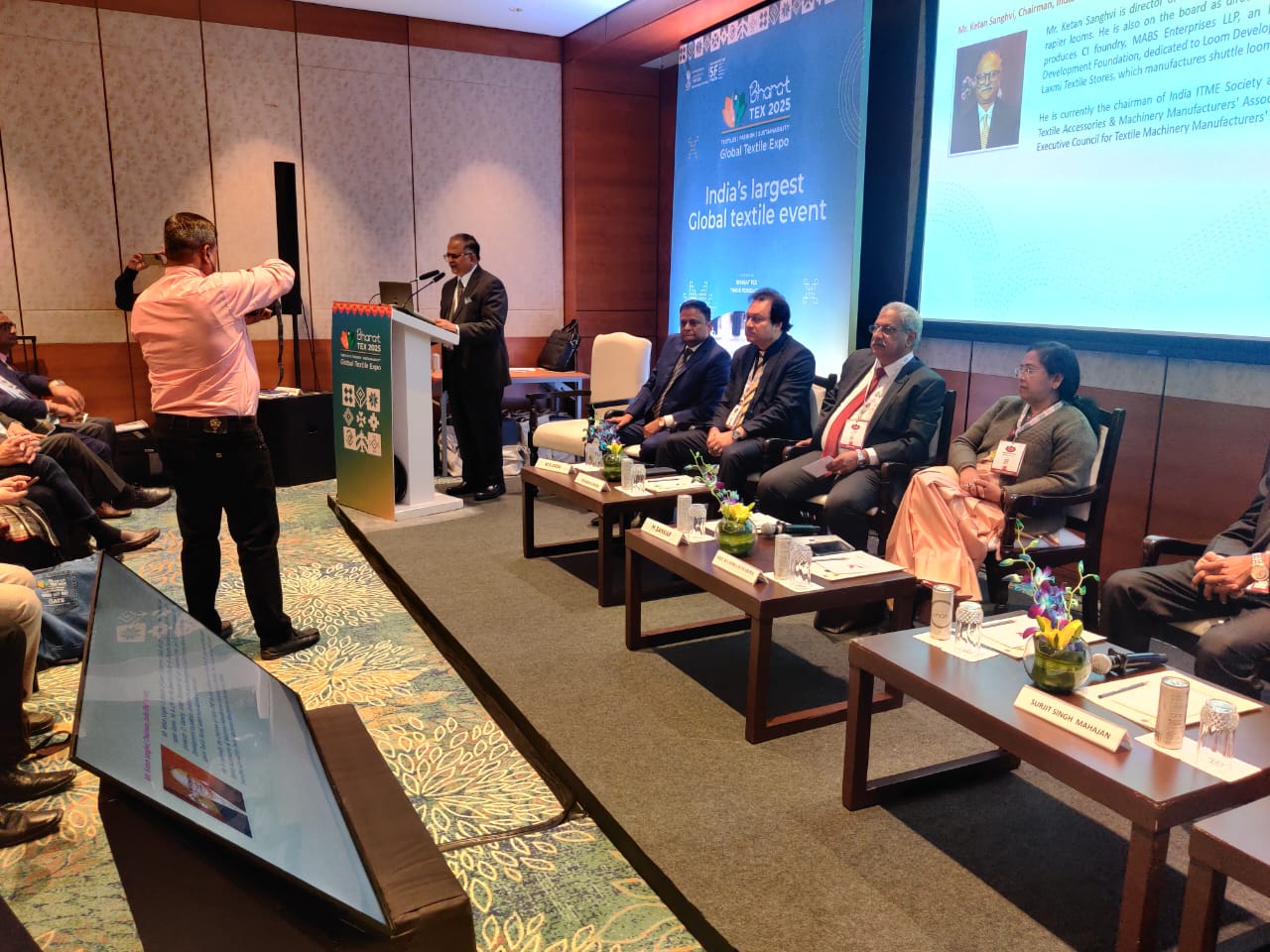
The ITME Society's knowledge session on Indian textile machinery manufacturing served as a crucial platform to address the industry's current landscape and chart a course for its future. Speakers emphasized the remarkable progress made, highlighting India's emergence as a key player in the global market. "We've come a long way," noted Manisha Sensarma, Economic Advisor, MoT, "but the journey towards global leadership requires sustained effort and a focus on cutting-edge technology."
Discussions revolved around the need for continuous innovation and technological advancements to maintain competitiveness. Experts stressed the importance of investing in research and development, focusing on automation, sustainable practices, and Industry 4.0 technologies. "The future of textile machinery lies in automation and smart solutions," M Sankar, President, LMW, asserted. "We need to embrace these technologies to enhance efficiency and productivity." The session also underscored the significance of government support through favorable policies and initiatives to boost domestic manufacturing and exports.
A key takeaway was the industry's potential to become a global leader. Speakers emphasized India's strengths, including a skilled workforce, a growing domestic market, and a rich textile heritage. By leveraging these advantages and focusing on quality, cost-effectiveness, and timely delivery, Indian manufacturers can capture a larger share of the global market.
The session concluded with a renewed sense of optimism and determination. Industry leaders expressed their commitment to collaborate and work towards a shared vision of making India a global hub for textile machinery manufacturing. The ITME Society's initiative served as a timely reminder of the industry's potential and the need for collective efforts to realize it.
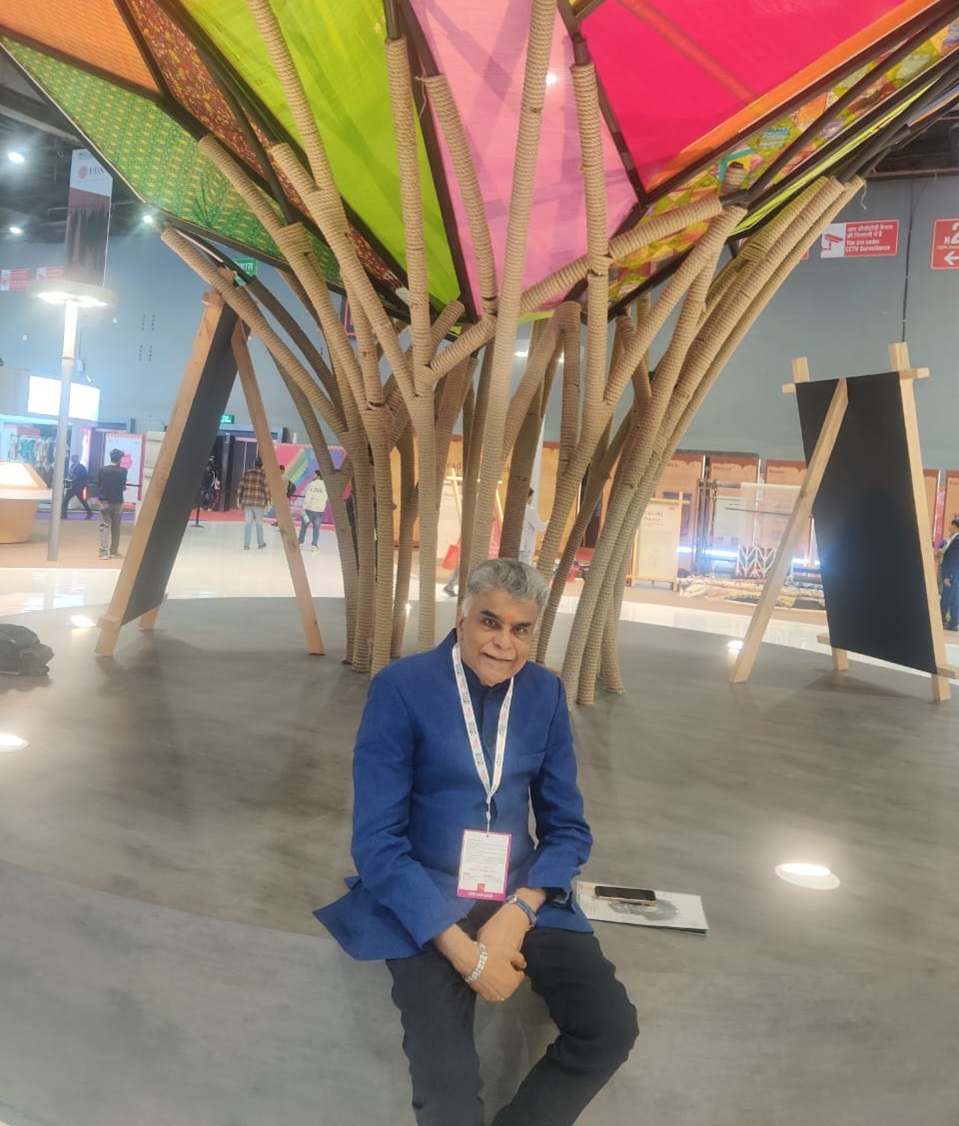
A Sakthivel, Founder President TEA and Ex-Chairman AEPC, shared his insights on Bharat Tex 2025. He expressed immense satisfaction with the event's international standards, highlighting the vision of Commerce and Industry Minister Piyush Goyal and the personal interest of Minister Giriraj Singh in its development. Sakthivel noted the impressive flow of high-quality buyers and the competitive spirit among exhibitors. He believes Bharat Tex will become a key event for global textile buyers, similar to the iconic MAGIC show in Las Vegas, offering a comprehensive ‘fiber to fashion’ experience, as envisioned by Prime Minister Modi.
Sakthivel emphasized India's commitment to sustainability, stating that the textile value chain has embraced ESG norms over the past five years. He highlighted the growing awareness among industry players about the importance of sustainability for survival in the international market. He pointed out that the exhibition itself showcases India's dedication to sustainable practices, from fiber to finished garment.
Regarding key takeaways from the exhibition, Sakthivel mentioned the potential for large orders, the high international standards on display, and the positive feedback from buyers. He acknowledged the government's efforts in policymaking and pointed to the rising importance of MMF (Man-Made Fibers) and sportswear, areas where India needs to catch up globally. He observed a significant increase in MMF products among exhibitors, indicating a shift in the industry.
Sakthivel's message to the trade focused on aligning with international demands, particularly regarding ESG norms and the adoption of MMF garments. He stressed the importance of adapting to global trends and embracing sustainable practices, echoing the sentiment of ‘save planet, save Earth.’ He wished all exhibitors success.
The global apparel industry is a complex web of production, consumption, and trade, with Bangladesh playing an important role as a major manufacturing hub. However, the industry faces challenges, demand drip due to economic slowdown, rising labor costs, environmental concerns, and the need for greater diversification. Therefore, a partnership between India and Bangladesh, termed ‘Bangladesh+1’, holds immense potential to reshape the regional and global apparel sector.
Bangladesh's RMG sector challenges
Bangladesh's ready-made garment (RMG) industry is its economies backbone. The sector has seen remarkable growth over the past few decades. However, this success is not without challenges. The industry faces issues such as over-reliance on RMG that makes the economy vulnerable to fluctuations in global demand and competition. Concerns about worker safety, wages, and working conditions persist. Falling demand in key export markets like Europe and the US has led to lower orders this has a direct impact on Bangladesh's export earnings. Domestic inflation is also putting pressure on wages, and worker unrest is a recurring concern. Frequent power outages and rising energy costs are disrupting production and increasing operational expenses. The political dynamics also create uncertainty for businesses, affecting investment decisions.
India's strengths in raw materials, manufacturing
India on the other hand has a robust textile and apparel sector with strengths in raw materials, as India is a major producer of cotton, yarn, and fabrics, providing crucial inputs for Bangladesh's garment industry. This is a significant advantage, as Bangladesh relies heavily on imported raw materials. India has a well-established textile manufacturing base, with expertise in spinning, weaving, and processing. And India has a pool of skilled professionals in the textile and apparel sector.
The Bangladesh+1 partnership, win-win for both
A strategic partnership between India and Bangladesh can create a win-win situation for both countries. India can support Bangladesh's garment industry by supplying raw materials of high-quality. India can also collaborate with Bangladesh to improve manufacturing processes, enhance productivity, and adopt sustainable practices. Joint initiatives can focus on developing new technologies and promoting innovation in the textile and apparel sector. Closer cooperation can reduce trade barriers and encourage greater investment flows between the two countries.
Regional cooperation in the textile and apparel sector offers several benefits. By leveraging each other's strengths, India and Bangladesh can enhance their competitiveness in the global market. Collaboration can lead to greater efficiency in production, logistics, and supply chain management. Joint efforts can focus on promoting sustainable practices and reducing the environmental impact of the industry. Also, cooperation in the textile and apparel sector can contribute to broader regional integration and economic development.
The challenges facing Bangladesh's RMG sector present a unique opportunity for India. By acting as a reliable partner and simultaneously leveraging government support and schemes to strengthen its own manufacturing capabilities India can support its neighbor and significantly boost its own apparel industry. This could be a catalyst for deeper regional integration, increased raw material exports, a stronger ‘Make in India’ initiative.
India’s spinning sector plays a crucial role in the global textile value chain. With its vast production capacity, diverse product range, and competitive pricing, India has emerged a leading yarn supplier.
A spinning giant
India holds the second-largest spinning capacity globally, after China which has over 100 million spindles. In 2024, the installed spindle capacity was 52 million, a substantial contribution to the global yarn market. This vast capacity allows India to effectively serve both domestic and international demand, solidifying its position as a key player. This scale allows India to capitalize on economies of scale, contributing to its competitive pricing.
A spectrum of yarns
What works for India is the versatility of yarns tailored to diverse customer needs.
Cotton yarns: India's abundant cotton production, the third largest globally, provides a readily available raw material for its spinning mills. Cotton yarn remains a cornerstone of the industry, widely used in apparel, home textiles, and industrial fabrics.
Polyester yarns: With rising demand for synthetic textiles, polyester yarn production has seen significant growth in India. This segment is a close competitor to cotton yarn in terms of volume.
Blended yarns: Indian spinners are adept at creating blended yarns, combining different fibers like cotton and polyester, viscose, or acrylic to achieve specific properties. This segment represents a significant portion of the market, offering specialized solutions to textile manufacturers.
Recycled yarns: With growing emphasis on sustainability, recycled yarn production is gaining traction in India. Utilizing pre- and post-consumer waste, this segment offers environmentally friendly options for textile manufacturing. While still a smaller segment compared to traditional yarns, it is the fastest growing, reflecting global sustainability trends.
Weaving a winning strategy
India a major exporter of yarns, several factors contribute to India’s competitiveness globally. Cost advantage due to lower labor costs and readily available raw materials. Indian spinners have invested heavily in modern technology and quality control measures to ensure their yarns meet stringent international standards. And India's well-established textile supply chain ensures a smooth flow of raw materials and finished goods.
Fluctuating prices a challenge
One challenge is price fluctuations. Raw materials prices fluctuate significantly, impacting profits. And there is stiff competition from other yarn exporting countries. Tariffs and trade barriers of importing countries can make Indian yarn less competitive. Inefficient logistics increase transportation costs and delays, affecting competitiveness. Currency fluctuations also affect competitiveness.
Government initiatives
The Indian government recognizes the importance of the textile industry and has implemented schemes to support its growth. These include:
Production Linked Incentive (PLI) Scheme: This aims to boost domestic manufacturing and attract investments. While the initial focus was on man-made fabrics and garments, the scheme's benefits indirectly support yarn spinning by stimulating demand for domestic yarn.
Textile Parks Scheme (PM MITRA): The PM MITRA scheme aims to establish integrated textile parks with world-class infrastructure, attracting scale investments. These parks are expected to benefit the spinning industry by providing access to better infrastructure and promoting cluster development.
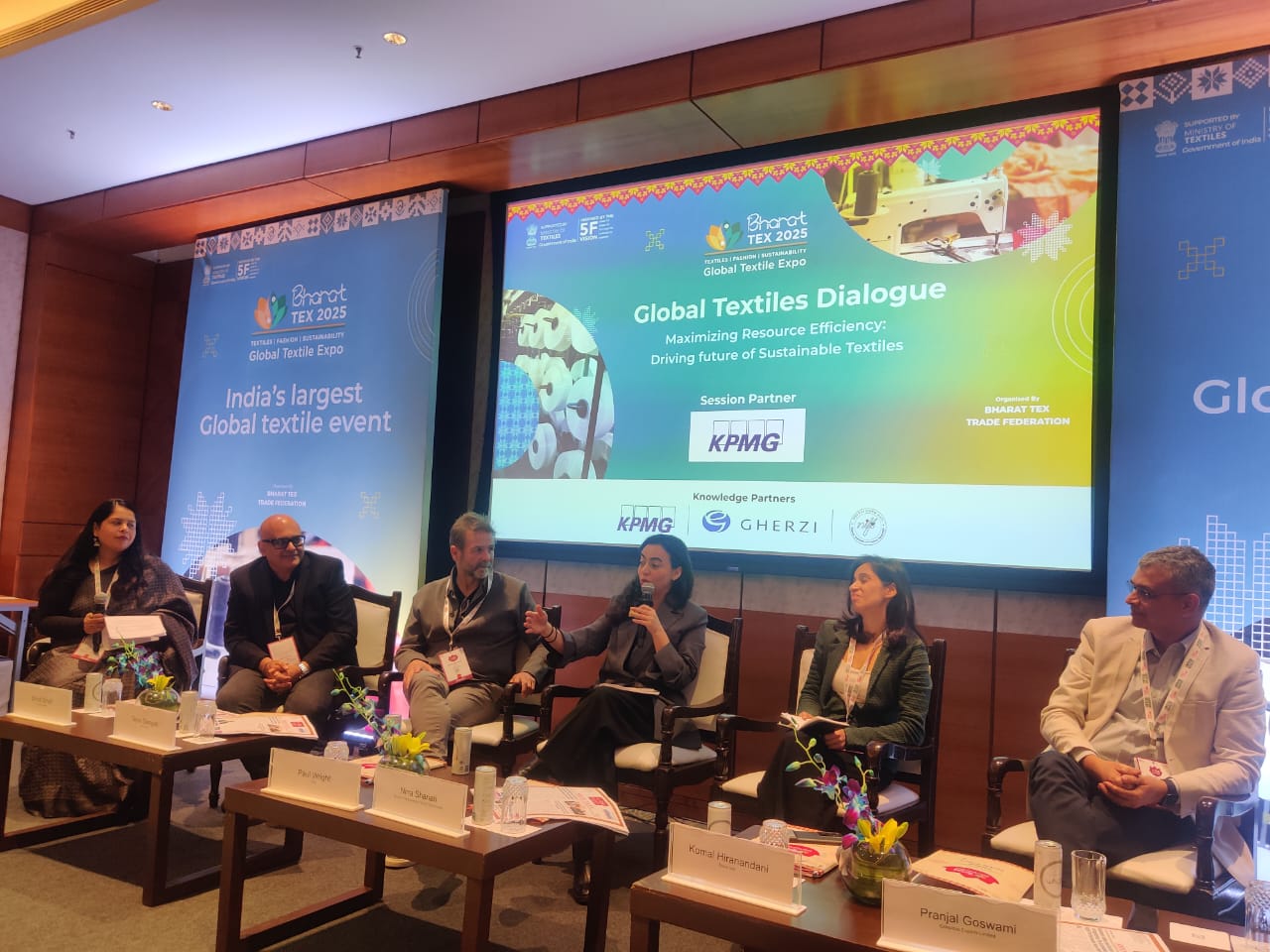
The fashion industry stands at a crossroads, with mounting environmental concerns and untapped economic potential. Komal Hiranandani, Director, Dolcevee, a sustainable clothing brand, highlights during a knowledge session at Bharat Tex, the burgeoning resale market as a key solution. A recent study revealed that 24 per cent of Indians have purchased pre-owned fashion, indicating a strong consumer appetite. Beyond the obvious environmental benefits, resale offers significant economic advantages. The Ellen MacArthur Foundation estimates that consumers globally lose $460 billion annually by discarding reusable clothing. Unlocking the logistics of resale is crucial to capitalizing on this lost value.
While downcycling and fiber-to-fiber recycling are important, prioritizing resale for garments with remaining life is the most economically and environmentally sound approach. The global resale market is booming, growing at an 11 per cent compound annual growth rate. Leading brands, from Gap to Gucci, are embracing resale programs, recognizing its integral role in the future of fashion.
In India, managed marketplaces, where items are quality controlled, are deemed more suitable than peer-to-peer resale. This ensures brand integrity and customer satisfaction. Furthermore, integrating resale into return processing can significantly reduce waste. Optoro's 2022 data shows that retailers in the US landfilled 9.6 million pounds of returned products. Resale offers a viable alternative, allowing returned items to be resold, either on the brand's website or through managed marketplaces, generating revenue and minimizing waste. The key lies in establishing strategic partnerships and efficient logistics to unlock the full potential of the resale revolution.
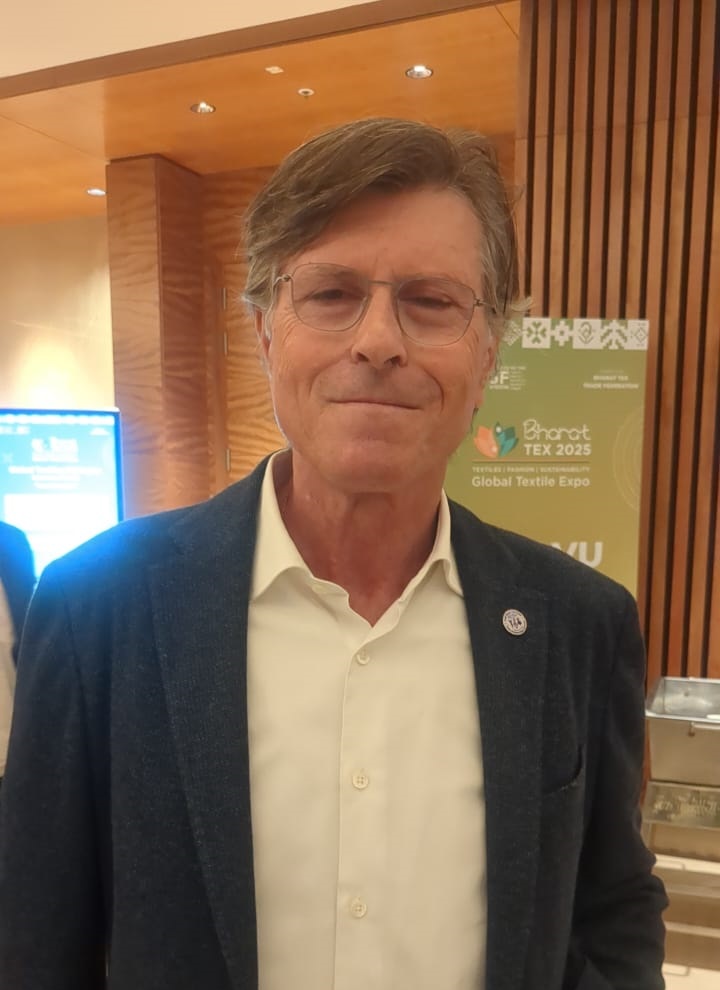
Juan Pares, soon to be President of the ITMF, was impressed by his first Bharat Tex visit. "Really, really good impression," he declared, speaking on the sidelines of a knowledge session at Bharat Tex, noting the well-organized event and the presence of key industry figures. His company, Santanderina Group, also had a strong presence and business with India.
Pares acknowledged the textile industry's challenging times, emphasizing the need for transformation. "We need to think more in margins than in volume," he stated, highlighting innovation as the key. This included innovation in products, techniques, digitalization, and even the industry's mindset. He stressed the importance of attracting young talent to the textile sector, competing with other industries like car manufacturing and digital businesses. "The key point is the talent," Pares insisted. "Human resource is the key." He linked talent to innovation, which required an open mindset.
Pares' connection with India goes back to 1986. Santanderina has a company in India, engaging in both sourcing and selling. They source garments, yarns, and fabrics, while selling protective wear and high-end fashion fabrics. They also source basic cotton fabrics, transforming them in Europe, as well as specialized yarns.
Pares sees immense potential for the Indian textile industry. He believes India needs to focus on eliminating trade barriers and negotiating better agreements with other countries to compete effectively with nations like Pakistan, Bangladesh, and China. He noted that cost isn't the only factor; developing new products and creating value are also crucial. While acknowledging India's current leadership in cotton, he pointed out the need to improve performance in polyester and polyamide to become a one-stop shop for global textile groups. He believes India has a bigger role to play, particularly by capitalizing on its strength in cotton.
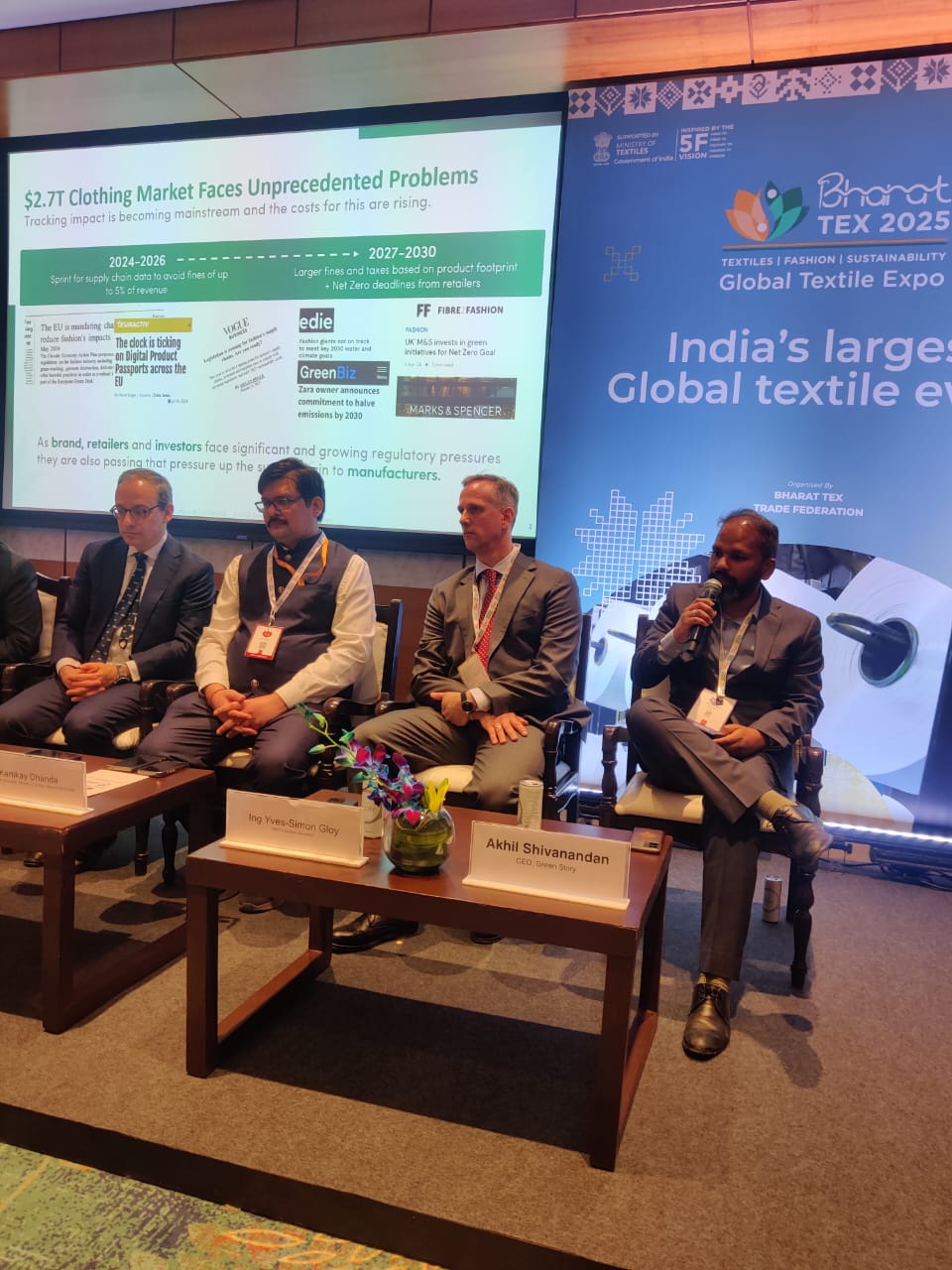
The manufacturing landscape is undergoing a data-driven transformation, driven by climate change and increasing demands for sustainability. Akhil Sivanandan, CEO & Co-Founder of Green Story, a leading company in this space, while speaking in a knowledge session, highlights the importance of data capture in manufacturing. He explains how automated facilities with data capture enable faster and more cost-effective life cycle assessments and carbon footprinting. Green Story has been pioneering this approach for over a decade, helping brands understand their environmental impact through precise data analytics.
Impending regulations, particularly in Europe, are accelerating this shift. The 2027 Carbon Border Adjustment Mechanism (CBAM) will require manufacturers to provide detailed process-level information. Sivanandan emphasizes that having the right data empowers informed supply chain decisions, preventing wasteful investments in ineffective initiatives.
With growing pressure on manufacturers from investors and consumers for accountability, data mastery is no longer optional. Sivanandan believes that by harnessing data, companies can not only meet regulatory requirements but also spearhead a sustainable future. In this evolving manufacturing era, effective data capture and analysis are essential for survival and success in the green revolution.
Green Story collaborates with over 200 global brands, specializing in Product Carbon Footprint (PCF) methodologies and life cycle assessments. The integration of smart facilities enables real-time data capture, crucial for both regulatory compliance and competitive marketing. Sivanandan envisions real-time life cycle assessments as game-changers, shifting from static assessments to dynamic, actionable insights.
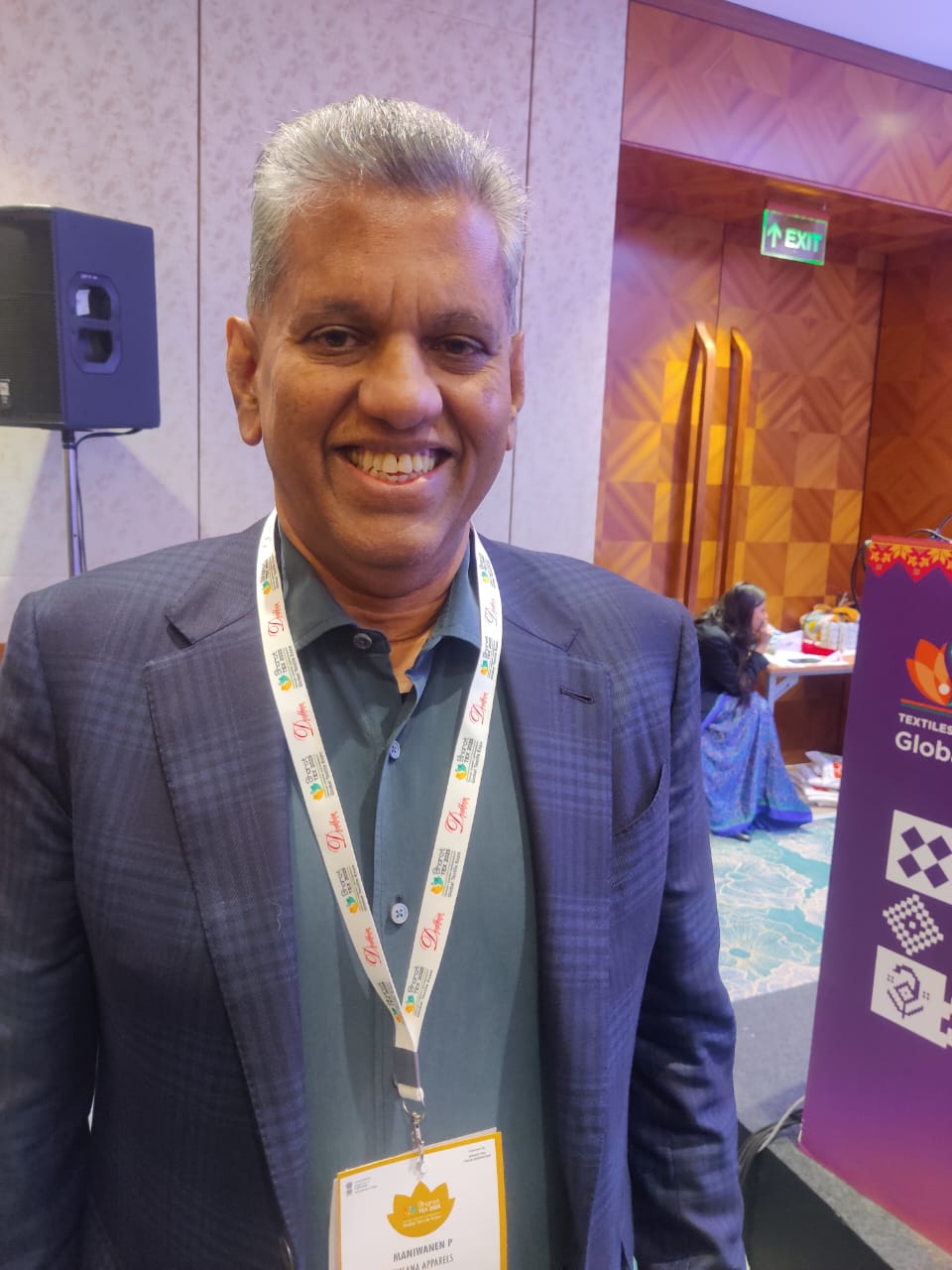
M Maniwanen, Chairman of Busana Apparel Group, Indonesia, envisions a textile industry where tradition and innovation intertwine. While acknowledging India's historical strength in cotton production, Maniwanen emphasizes the crucial need to embrace MMF to ensure the industry's future.
During an interview on the sidelines of Bharat Tex 2025, Maniwanen addressed the traditional divide between cotton and MMF. He pointed out the changing dynamics of the MMF market, noting that previously, a few large corporations dominated the sector. However, he sees significant opportunities arising from the Indian government's supportive policies, including incentives for land, labor, and capital, which are creating a fertile ground for smaller players and innovation. This support, he argues, is vital for the industry's evolution.
Maniwanen's vision centers on blending the inherent qualities of cotton with the advantages of MMF. He believes the future lies in creating fabrics that combine the softness and comfort of cotton with the durability and versatility of synthetic fibers. This approach, he contends, is not only about creating competitive products but also about achieving sustainability, a critical factor for the modern textile industry.
He actively fosters alliances with Indian textile manufacturers, sharing knowledge and resources to develop innovative and eco-friendly fabrics. The results of these collaborations are now visible. New collections showcase innovative designs blending cotton's rich textures with MMF's resilience.
Busana Apparel Group has emerged as a symbol of innovation, demonstrating that the future of textiles lies in embracing change, fostering collaboration, and weaving together the best of both natural and synthetic worlds.












